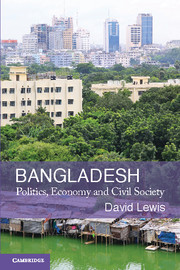Book contents
- Frontmatter
- Contents
- Maps
- Abbreviations
- Acknowledgements
- 1 Introduction
- 2 A State in the Making
- 3 Towards Bangladesh
- 4 State, Politics and Institutions
- 5 Nongovernmental Actors and Civil Society
- 6 Economic Development and Transformation
- 7 Population, Natural Resources and Environment
- 8 Conclusion
- Glossary of Bengali Terms
- Bibliography
- Index
8 - Conclusion
Bangladesh Faces the Future
Published online by Cambridge University Press: 05 June 2012
- Frontmatter
- Contents
- Maps
- Abbreviations
- Acknowledgements
- 1 Introduction
- 2 A State in the Making
- 3 Towards Bangladesh
- 4 State, Politics and Institutions
- 5 Nongovernmental Actors and Civil Society
- 6 Economic Development and Transformation
- 7 Population, Natural Resources and Environment
- 8 Conclusion
- Glossary of Bengali Terms
- Bibliography
- Index
Summary
This account of Bangladesh's state, economy and civil society began by considering the situation of the garment industry workers, many of whom once again took to the streets during 2010 in pursuit of higher pay and improved working conditions. The protests provided an entry point into an analysis of the country's political economy and as a microcosm of issues arising from its precarious location at the periphery of the global economy. In considering the “past of the present,” it has been necessary to explore the historical factors that continue to influence contemporary Bangladesh, alongside the more familiar and well-documented worlds of the international aid regime – including struggles over land and tenancy, an incompletely institutionalised postcolonial state, the dominance of social and political patronage relationships, the country's fragile ecological interdependence with its neighbours and the pluralist religious traditions in society that have long characterised the Bengal delta.
The concluding chapter draws together the main ideas and discussions of the earlier seven chapters and assesses the key dilemmas for the future in relation to building a more inclusive politics, securing economic growth while addressing rising inequalities, operating on a rapidly changing international stage and dealing with increasing environmental challenges. An important motivation for writing this book is the fact that Bangladesh has received far less attention from researchers, policy makers and the media, particularly in Western societies, than it deserves. The case of Bangladesh should be of central concern to anyone interested in at least four important sets of wider contemporary issues: the ways that processes of economic globalisation are impacting upon low-income countries; the challenges of improving international development policies and practices; the need to understand how a stable “moderate Muslim majority” country addresses the threat of extremism within an international context in which Muslims are increasingly demonised as global terrorists; and peoples’ struggle to build viable and sustainable livelihoods under the environmental threat of climate change. In the second part of the chapter, each of these themes is discussed further.
- Type
- Chapter
- Information
- BangladeshPolitics, Economy and Civil Society, pp. 197 - 206Publisher: Cambridge University PressPrint publication year: 2011



